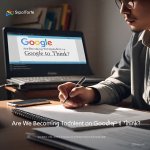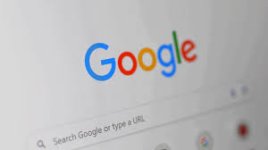The Modern Brain: Powered by Google?
Can you remember the last time you solved a problem without Googling it?
From “how to boil an egg” to “is Pluto a planet again,” we reach for the search bar like a reflex. But with billions of queries a day, a bold question is rising:
Are we becoming smarter because of Google—or too mentally lazy to think for ourselves?
Outsourcing the Brain
Psychologists call it the “Google Effect” or digital amnesia—the tendency to forget information because we know we can just look it up again.
Students don’t memorize facts. Professionals rely on quick searches over deep understanding. Even trivia nights are suspiciously quiet without phones.
It’s not that we don’t know. It’s that we don’t need to know.
But at what cost?
Thinking vs. Searching
Google has made information instantly accessible, but that doesn't mean it improves:
Critical thinking
Problem-solving
Creativity
In fact, the constant search-loop might be doing the opposite.
Rather than working through a problem, people now:
1. Search for “the answer”
2. Skim the top result
3. Accept it as truth
What gets lost? The thinking part.
What About Learning?
In schools and universities, Google is both a gift and a curse.
 It democratizes knowledge
It democratizes knowledge
 It helps students find ideas fast
It helps students find ideas fast
But it also encourages copy-paste culture, shallow learning, and surface-level understanding.
it also encourages copy-paste culture, shallow learning, and surface-level understanding.
Educators now struggle with questions like:
Are students learning to think—or just search?
Should we focus on teaching how to evaluate sources, not just find them?
Are We Losing Intellectual Navigation?
The scariest part may not be forgetting facts—it’s forgetting how to learn.
If Google disappeared tomorrow, could most people:
Navigate a city without Maps?
Cook without a recipe?
Solve a problem without the top 10 list?
Dependence on search engines isn't just about information—it's about mental independence.
Tool or Trap?
Google is not the enemy. It’s an incredible tool—if used wisely.
We can:
Use it to supplement, not replace memory
Fact-check, not blindly trust
Combine search with deep thought, not lazy answers
The issue isn’t Google.
It’s how we’ve let it become a substitute for thinking.
 What Do You Think?
What Do You Think?
 Are we using Google to expand our minds—or avoid using them?
Are we using Google to expand our minds—or avoid using them?
 Should schools limit Google access to force deeper learning?
Should schools limit Google access to force deeper learning?
 Are we raising a generation that knows everything—but understands nothing?
Are we raising a generation that knows everything—but understands nothing?
Can you remember the last time you solved a problem without Googling it?
From “how to boil an egg” to “is Pluto a planet again,” we reach for the search bar like a reflex. But with billions of queries a day, a bold question is rising:
Are we becoming smarter because of Google—or too mentally lazy to think for ourselves?
Outsourcing the Brain
Psychologists call it the “Google Effect” or digital amnesia—the tendency to forget information because we know we can just look it up again.
Students don’t memorize facts. Professionals rely on quick searches over deep understanding. Even trivia nights are suspiciously quiet without phones.
It’s not that we don’t know. It’s that we don’t need to know.
But at what cost?
Thinking vs. Searching
Google has made information instantly accessible, but that doesn't mean it improves:
Critical thinking
Problem-solving
Creativity
In fact, the constant search-loop might be doing the opposite.
Rather than working through a problem, people now:
1. Search for “the answer”
2. Skim the top result
3. Accept it as truth
What gets lost? The thinking part.
What About Learning?
In schools and universities, Google is both a gift and a curse.
But
Educators now struggle with questions like:
Are students learning to think—or just search?
Should we focus on teaching how to evaluate sources, not just find them?
Are We Losing Intellectual Navigation?
The scariest part may not be forgetting facts—it’s forgetting how to learn.
If Google disappeared tomorrow, could most people:
Navigate a city without Maps?
Cook without a recipe?
Solve a problem without the top 10 list?
Dependence on search engines isn't just about information—it's about mental independence.
Tool or Trap?
Google is not the enemy. It’s an incredible tool—if used wisely.
We can:
Use it to supplement, not replace memory
Fact-check, not blindly trust
Combine search with deep thought, not lazy answers
The issue isn’t Google.
It’s how we’ve let it become a substitute for thinking.


